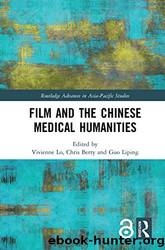Film and the Chinese Medical Humanities by Vivienne Lo & Chris Berry & Guo Liping

Author:Vivienne Lo & Chris Berry & Guo Liping [Lo, Vivienne & Berry, Chris & Liping, Guo]
Language: eng
Format: epub
ISBN: 9781138580299
Google: HuR1xQEACAAJ
Amazon: B082DM2WS4
Goodreads: 45989317
Publisher: Routledge
Published: 2019-11-20T20:31:25.669078+00:00
Itineraries through a plural medical landscape
As Fang Lei embarks on a journey to heal herself of her soulless life and gothic fantasies, she takes us through the maze that is the dysfunctional emotional and medico-spiritual architecture of Beijing and its environs, to glitzy clubs full of gigolos, solemn Tibetan-Buddhist temples where her aunt from out-of-town agonises over salvation; to Daoist priests down hidden alleyways whose talismans will protect her from the evil spirits â evil spirits that are residing in her torso â to suburban fortune tellers with whom she prays and whose spiritual empathy brings her to tears. Their sexual and spiritual quests for healing illustrate a very female ârelation between the spatial structures and their inhabitantsâ and the ways in which space and architecture identify the human body (Boumeester 2011: 247; Landy 2010: 121).
Poignantly, despite a swift descent into what would certainly be labelled an emergency in psychiatric terms, an inability to distinguish dream from reality, Fang Lei never consults a psychiatrist. The male students in our audience were outnumbered 2:1 by the women, but they had strong opinions about the solutions to Fang Leiâs problem. Liu Hanwen stated, âshe should have some communication with her husband or seek some psychological helpâ. Another, a professional male psychiatrist, Zhou Dangwei, was the only person in the audience to proffer a psychiatric interpretation of Fang Leiâs condition:
I believe that, from a psychological standard the woman in that movie became more and more psychotic. Because before she was a bit neurotic but not so ⦠bad. But after a lot of wrong treatments she became more and more psychotic. Because, she treated the [ghost] figure as real, equal to the fantasy figure in her dream. This is very dangerous, for her real life. I think she will become schizophrenic. She will become more and more paranoid.
(tr. Guo Liping)
Despite her girlfriendâs advice, however, Fang Lei never visits a psychiatrist or therapist. The director says:
Around me, in Beijing, as far as I know, there are many professional women, artists, and intellectuals who will choose to consult Buddhists, Rinpoche and other religious masters to solve their own psychological problems. The reason for this is first that psychiatry in China is not very developed. Secondly, talking with Daoist or Buddhist masters can give these people psychological comfort.
(tr. Guo Liping)
The field of Health Humanities has long embraced study of all the broader ways in which healthcare involves those other than professional medical communities. It has, however, been commonplace to believe that religious healing and traditional medicine survive only in remote and impoverished places where modern medicine cannot reach. But Longing for the Rain represents a plurality of medical care that is fashionable in elite and privileged urban circles.
Fang Lei first turns for help to her outrageously lascivious and well-heeled girlfriend, whose name always remains a mystery, and with whom she first tries shopping therapy. On one trip her friend suggests that her fantasies are simply sexual frustration and gives her sex toys and advises taking a young lover.
Download
This site does not store any files on its server. We only index and link to content provided by other sites. Please contact the content providers to delete copyright contents if any and email us, we'll remove relevant links or contents immediately.
L Equipe NP by 22793(878)
Application of a Novel Technique for Clinical Evaluation of Nitric Oxide-Induced Free Radical Reactions in ICU Patients by Unknown(736)
Rosenâs Emergency Medicine Concepts and Clinical Practice by Ron Walls; Robert Hockberger; Marianne Gausche-Hill; Timothy B. Erickson; Susan R. Wilcox(601)
Constructing Canine Consent; Conceptualising and Adopting a Consent-focused Relationship with Dogs by ERIN JONES(462)
Oxidative damage to surfactant protein D in pulmonary diseases by Vitality Starosta1 & Matthias Griese1†(445)
Social Science Perspectives on Global Public Health by Vincent La Placa & Julia Morgan(414)
Chassin's Operative Strategy in General Surgery: An Expositive Atlas by Carol E. H. Scott-Conner Andreas M. Kaiser Ninh T. Nguyen Umut Sarpel Sonia L. Sugg(408)
ADVANCED EMERGENCY CARE AND TRANSPORTATION OF THE SICK AND INJURED by Unknown(352)
Irwin and Rippeâs Intensive Care Medicine by Unknown(348)
Organic Chemistry: An Acid - Base Approach by MICHAEL SMITH(336)
Diagnostic and Statistical Manual of Mental Disorders, Fifth Edition, Text Revision (DSM-5-TR(tm)) by Unknown(313)
Access to Medicines and Vaccines in the South : Coherence of Rules and Policies Applied by the European Union Commission by Stephen Kingah(305)
Saunders Nursing Drug Handbook 2024 - E-Book by Unknown(304)
Davis's Comprehensive Manual of Laboratory and Diagnostic Tests with Nursing Implications by Unknown(287)
Information Technology for Education, Science, and Technics by Unknown(287)
Human Microanatomy; Cell Tissue and Organ Histology with Celebrity Medical Histories by Stephen A. Stricker(286)
Socio-Life Science and the COVID-19 Outbreak : Public Health and Public Policy by Makoto Yano; Fumihiko Matsuda; Anavaj Sakuntabhai; Shigeru Hirota(277)
Berne and Levy Physiology E-Book by Unknown(266)
Replacing the Dead by Mie Nakachi;(264)
